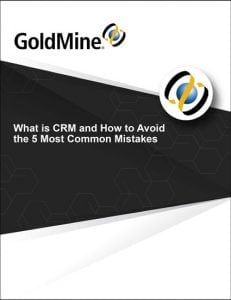What is CRM
& How to Avoid the 5 Most Common Mistakes

The modern business is a complex operation with a lot of moving parts. You have employees, customers, partners and critical business information that you need to access at a moment’s notice. In short, a Customer Relationship Management (CRM) system helps you centralize your most important data in one place. Through a single computer interface you can retrieve, create and edit every vital piece of information you need and everyone in your company can see these records in real time. That’s the power of CRM.
With the advent of technology, your employees can access information at any time from any device. Whether they are sitting at their office desk or on the road, your CRM data can be accessed by a PC, a mobile phone, a tablet or any device that has connection to the cloud. Most CRM systems offer your team instant and immediate access to vital contact information that makes it easier to close deals, service customers and keep things organized.
Integrating CRM systems ranges from the easy to the complex and there is no shortage of platforms to pick from, with a dizzying array of features. It is also important to mention that no two businesses are alike and therefore, every company will have a very unique set of needs to consider before jumping into or switching CRM systems.
Unlike a lot of other technology platforms, CRM touches every business unit and can make a significant impact on areas like Sales, Marketing, Human Resources, Customer Service and even the Financial /Operational teams. All business segments benefit from CRM.
Making The Case for CRM
- Look up any contact
- CRM can improve forecasting
- It’s not just for Sales Teams
- Track Customer Life-cycle
- Identify marketing leads
- Access data from anywhere
- Integrate with other systems
- Manage employee data
- Manage vendor contacts
- Store notes and documents


